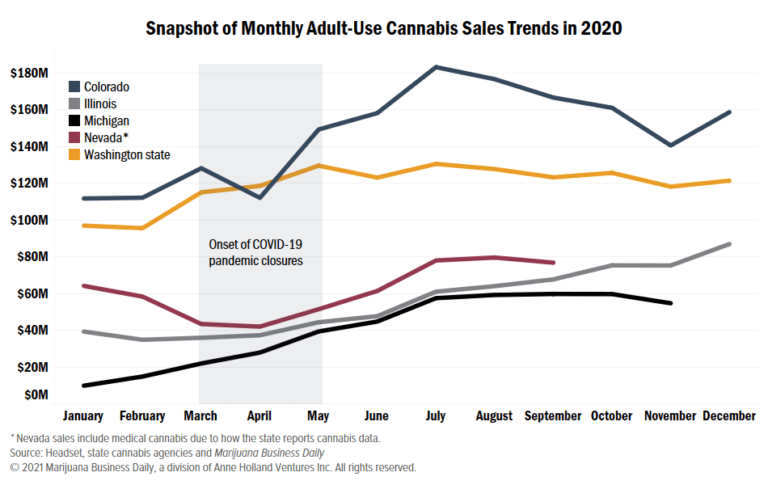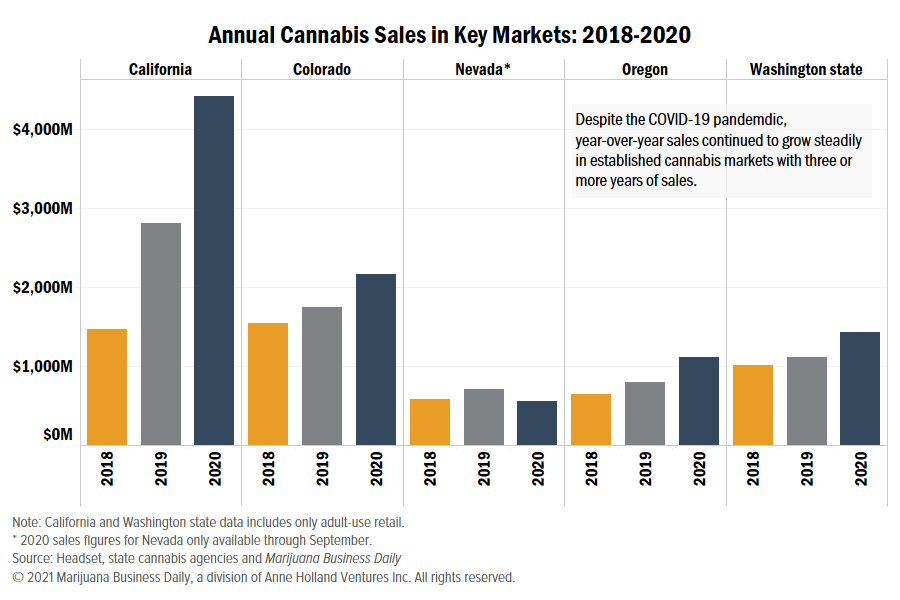The COVID-19 outbreak that began about a year ago has proved devastating for many mainstream industries – including airlines and restaurants, for starters – but for those in the cannabis business, 2020 turned out to be a record-setter.
Sales of medical and recreational marijuana products smashed former records set in mature markets such as Colorado and Oregon. In emerging markets, including Illinois and Ohio, sales set new, high bars for performance.
If anything, analysts said, sales will continue to climb. It’s only a question of how big the numbers will get.
The industry was bolstered after more than two dozen states with functional marijuana markets – as well as the District of Columbia and Puerto Rico – declared their cannabis industries “essential,” allowing businesses to continue operations throughout the pandemic.
One exception was Massachusetts, where the governor ordered adult-use marijuana businesses to close for two months, while medical marijuana companies were dubbed “essential.”
“A lot of that was probably driven by COVID,” Liz Connors, director of analytics at Seattle-based Headset, said of the record-setting sales levels.
“There’s not a lot to do. There’s not a lot of new experiences we can have. We’re precluded from traveling and gathering in groups, and I think cannabis products offered a fun and interesting experience for a lot of people.”
At least some retailers expect the nationwide uptick in sales to only presage a bright future for the industry, given that the pandemic has helped reshape consumer habits, including replacing products such as alcohol and opioids and even sleep aids with marijuana.
“There was a tidal wave of demand” throughout 2020, said Linda Marsicano, spokeswoman for Illinois-based Green Thumb Industries, which has a marijuana industry footprint in 12 states across the U.S.
“And we expect the demand to continue.”

By the numbers
A snapshot of a few marijuana markets across the U.S. revealed that even states that took a hit at points during 2020 – such as Nevada, where tourism dried up for several months starting in March – either rebounded or grew steadily throughout the year.
That was true for both Nevada – where cannabis retailers were restricted to delivery-only sales for months – as well as Massachusetts, where recreational sales were halted altogether from March 24 until May 25.
Even states without final tallies for all of 2020 reported record sales figures, including California, Colorado, Massachusetts, Nevada, Oregon and Washington, according to data from Headset and state agencies.
Overall, the Marijuana Business Factbook forecast national sales would hit $10.6 billion-$13 billion in 2019 and $18 billion-$21.6 billion in 2020. Because there is variability in how states track and report sales, Marijuana Business Daily provides an estimated range of total sales across markets.
Some specifics:
- California’s legal market – which launched in 2018 – hit $4.4 billion in sales, compared with $2.8 billion in 2019 and $1.4 billion in 2018.
- Colorado’s sales figures for medical and recreational cannabis exceeded $2 billion even without December sales yet tabulated, up from $1.7 billion in 2019 and $1.5 billion in 2018.
- Oregon’s annual sales surpassed $1 billion for the first time in 2020, and the state had four months in a row, starting in May, when recreational and medical sales combined set a record at more than $100 million.
- Washington state, the second-oldest adult-use market in the country, reached a sales high of $1.4 billion in 2020, up from $1.1 billion in 2019 and just over $1 billion in 2018.
- Illinois set a high bar for performance in its first year of adult-use sales by breaking the $1 billion threshold.
- Massachusetts hit almost $700 million in sales, up roughly 56% from 2019 – despite last spring’s adult-use store closures.
- Even tourist-reliant Nevada, which has yet to report sales figures for the final quarter of 2020, appears on pace to beat its 2019 sales totals of $701 million, with more than $554 million in medical and recreational sales through September.
Not only COVID-19
The most obvious factor that set 2020 apart from previous years was the coronavirus pandemic – which accounted for much of the sales boost, experts agreed.
Andrew Livingston, director of economics and research at Denver-based VS Strategies, agreed and pointed out that most consumers in 2020 were finding other ways to spend money because traditional ways to relax – such as going to concerts and the like – were all canceled because of COVID-19.
So, many consumers pivoted to trying cannabis.
“You can’t be spending $500 on festival tickets, because your festivals are closed. So people have a little bit more money on their hands … that they’re utilizing to relax,” Livingston noted.
But several experts also said 2020 would have been a solid year even without the virus since the legal cannabis industry has been growing steadily for years.
Beau Whitney, an Oregon-based independent economist who tracks the marijuana industry, argues that chalking up much of the sales figures to the coronavirus is a mistake.
“What I’m seeing is that the narrative out there is that you’re seeing 38% growth, 41% growth. You see publications … saying, ‘From January to December, there was this amount of growth,’ and they’re attributing it to COVID. That, to me, is a mistake,” Whitney said.
“What is the COVID bump? I don’t believe the COVID bump is 30% or 40%. I think it’s more like 10% or 15%.”
Whitney points to the growing mainstream acceptance of marijuana.
And while he agreed the coronavirus helped accelerate that acceptance, he believes much of the sales growth stems from organic market maturation and how businesses have continued expanding their footprints across the nation.
“Is that growth going to be sustained in 2021? Yes, absolutely, but it’s not just due to COVID. It’s due to the natural growth of the market, greater participation, greater acceptance and less stigma,” he said.
Some of the data backs up Whitney’s assertion, such as Nevada sales resurging despite a lack of tourism. That suggests local consumption went up, which indicates broader acceptance by residents instead of canna-curious tourists.
Will sales levels continue to rise? Signs point to yes
Experts agreed that while 2020 might have set a new bar for industry performance, it’ll likely be an easy one to meet as the legal marijuana sector continues to grow.
“I think they’re going to continue right on through” with the same solid sales levels, said Jon DeCourcey, director of equity research at New York-based cannabis data group Viridian Capital Advisors.
But, DeCourcey cautioned, company owners shouldn’t expect the same astronomical rate of sales growth as the industry experienced in 2020, for various reasons.
“But it’ll be pretty strong growth, nonetheless,” he predicted, citing the opening of more new markets, further maturation of existing ones and various state legislatures that will likely approve adult-use legalization, such as New York.
“The big thing this year is you’ll probably see a lot of states passing rec laws,” DeCourcey said. “2021 is definitely going to be a year of more growth and consistent, strong demand.”
Nic Easley, the CEO and founder of 3C Consulting in Colorado, agreed with that assessment and said the 2020 sales data was “exciting” because of what it portends for the industry’s future.
“This is only the start of positive stories, for years and years to come,” Easley said. “I’m not worried it’s going to slow down, ever.
“It’s only going to get better. It’s going to slow down for certain sectors, or smaller operators, but consumption has become normalized.”
John Schroyer can be reached at johns@mjbizdaily.com
Andrew Long can be reached at andrew.long@mjbizdaily.com
Jenel Stelton-Holtmeier, editorial director for new business initiatives and data, contributed to this report.





